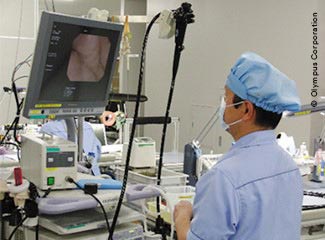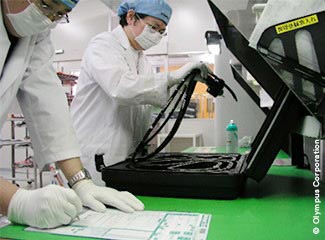


Press Release, Tokyo & Paris – August 3rd 2021
Olympus Corporation, a major Japanese manufacturer of optics and reprography products with headquarters in Tokyo, has deployed in its Japanese factories the « Tracking Solution for Infectious Diseases (COVID-19) » provided by Macnica Networks, a global network, security and cloud solutions provider with headquarters in Yokohama City, Kanagawa Prefecture, an Actility Channel Partner distributing and supporting ThingPark IoT platform. Olympus’ goal is to reduce the risk of service interruption and spread of infectious disease by quickly and accurately identifying infected people who have been in close contact, and therefore to ensure a stable supply of medical equipment.
Read Macnica’s Press Release (in Japanese) and detailed use case description here (in Japanese).
The solution, based on Actility’s Proximity Detection & Contact Tracing for Covid-19, is using Abeeway sensors and Actility’s ThingPark Enterprise for private LoRaWAN IoT connectivity in SAAS in order to track the contact history of people infected with the coronavirus and those who have come into close contact with them in factories.
Olympus, also a leading company in the medical equipment industry, has been implementing thorough measures to prevent infectious diseases in response to the spread of COVID-19. In the face of the coronavirus, the company has been working on countermeasures with the mission of « never stopping medical device reparation services » and was considering the introduction of even more robust measures to minimize all risks in order not to stop the operation of the repair center.
In factories and repair centers, it is difficult to fully introduce telework, and employees inevitably must work on-site. Under normal circumstances, employees work with social distance, but depending on the nature of the work, it is inevitable that they will have close conversations during meetings, trainings, guidance, consultation, etc.
In addition, even if we take all possible measures in the workplace, we cannot eliminate the risk of infection outside the home or workplace, and there is a risk that viruses brought in from outside may cause clusters in the factory. Once an infected person or a person in close contact with an infected person is confirmed, there is no way to objectively measure who the person was in contact with and to what extent in the factory, and the company had no choice but to narrow down the list of people in close contact with based on vague information from memory. At Olympus’s overseas repair factories, when an infected person was confirmed, the entire production line had to take a leave of absence, which affected the manufacturing and repair operations.


Among the company’s products, there are gastrointestinal endoscopes, which are used for visualization, diagnosis, and treatment of the digestive tract such as the esophagus, stomach, and intestines, Olympus boasts a high market share of over 70% globally. Medical devices, including endoscopes, are directly related to health care, as they are used for regular medical checkups and surgeries, and therefore require high quality and strict management.
« The endoscopes of today are not only for examination but also have the fate of being a therapeutic instrument for direct treatment. That’s why it is very important from a social standpoint to maintain a stable supply of equipment by establishing a stable repair system, » explained Tsutomu Hosoya, who is in charge of BCP promotion in the medical repair department. That is why it is required to repair and return the repaired products received from medical institutions as quickly as possible and with accurate quality.
In Japan, more than about 10 million endoscopic examinations are performed annually. In order to continue providing endoscopes to the medical field, the company has established a system that enables high-quality repair and maintenance all over the world, and currently has over 150 repair centers globally.
This « Tracking Solution for Infectious Diseases (COVID-19) » provided by Macnica Networks is a system that monitors the contact status using small sensors using LoRaWAN®/BLE from Abeeway, a subsidiary of Actility, a global provider of LWPAN connectivity solutions. The sensors, under a badge format, are worn by each employee and measure the distance through BLE wireless communication with each other, and when the contact condition exceeds the standard value corresponding to intensive contact, an alert is sent to the centralized management application in the cloud. The application displays and records the contact alert status of all devices. The data can be searched backward in time and date and can be exported as a CSV file.
« Even though the solutions introduced in Japan before were over-spec and highly accurate, they were expensive as a result. Moreover, they were still in the development stage, so they were not the most suitable for us, who wanted to deploy them as soon as possible, » said Hosoya. They wanted a solution with a system and logic as simple as possible.
« That’s why we focused on the LPWA solution using LoRaWAN provided by Macnica Networks. In particular, the simplicity of the solution, which can be managed by a server in the cloud, as well as the budget, met the company’s requirements« . However, Mr. Atsunori Ikeuchi, who is in charge of systems in the medical repair department, recalls that there were some systemic concerns from the beginning. « We were concerned about whether or not the system would have any impact on the company’s internal facilities, as it uses radio waves, and whether or not there would be any radio wave interference from the already installed facilities. In fact, we found out that LoRaWAN is capable of long-distance communication, saves power, and is resistant to noise. In this sense, we thought that it would have little impact on the existing environment, » he explains.
There was another concern that the number of repeaters would become huge because many devices would communicate with one repeater in order for repair workers to wear the device. « If a large number of LoRaWAN repeaters are required, the operational burden will increase in terms of maintenance and response to failures. However, we found out that we only needed about two of them for a single floor, which impressed us once again with the amazing technology, » said Mr. Ikeuchi.
This solution is currently in operation at two factories, monitoring the contact status of hundreds of employees. Employees wear dedicated devices on their chest at the beginning of their workday and keep it on until the end of their workday. The badge is small enough that it does not interfere with the work and is operated with little burden.
In fact, when a case of suspected close contact occurred among employees, the company was able to use this system to quickly determine who the person in question was in close contact with in the factory, and the company was able to confirm the effectiveness of this system.
As for the concerns about behavioral monitoring, they were able to resolve them by turning off the GPS function, informing the field that they would only use the contact history in case of emergency, and educating them about the significance of this.
Olympus decided to implement this system because of its superiority in the following areas:
The introduction of the LPWA solution has made it possible to quickly investigate the contact history in the event of an emergency and has succeeded in creating an environment that minimizes business risks from the perspective of business continuity. The company has also been able to establish a stable process for medical institutions that request repairs, which is helping to build a sense of trust. « We have been holding weekly status sharing meetings with each SORC, and we have received reports that the system is operating without any problems, such as the stable collection of contact history, » Hosoya explains.
With the introduction of this solution, some workplaces have begun to use the acquired data to design work lines and work styles that do not lead to intensive contact in the first place. Mr. Hideki Ohki, who is in charge of SORC management and implementation, explains the new trend: « By looking at the history, we are able to identify the processes that may lead to intensive contact, and we are now considering how to avoid such processes in the process of business improvement ».

LoRaWAN® is a widely used wireless protocol that allows battery-operated devices to communicate with IoT applications via long-range, wireless connections, allowing longer battery life, thus lowering the cost of device ownership. LoRaWAN® is especially useful in large-scale deployments because of its availability, cost, and reach, due to its use of unlicensed spectrum, the availability of standardized, low-cost modules with long battery life. Actility provides the LoRaWAN® network server and a highly reliable and advanced IoT platform for network management – ThingPark™, already powering the vast majority (over 50) of public nationwide LoRaWAN® deployments and hundreds of companies worldwide.
ThingPark Enterprise is a LoRaWAN IoT connectivity management platform that helps customers build network infrastructure by managing LoRaWAN gateways, add new LoRaWAN devices, monitor network operations, and control the flow of data to application servers. ThingPark Enterprise is specifically designed for enterprises: it’s a simple, scalable, and easy way to operate, and offers a unique low-power IoT communication infrastructure to enable an infinite number of industrial use cases.
Currently, COVID-19 has led to the installation of LPWA solutions at two medical device repair centers. In the future, the LPWA solution is expected to be used for new applications, such as monitoring the entry history of people in dangerous areas, or checking if anyone is left behind in a factory in the event of a natural disaster.
« For example, we may consider using it to grasp the history of people’s entry into areas where cameras cannot be installed, while gaining the understanding of workplaces, and we look forward to Macnica Networks’ proposals on how to use this system after COVID-19 comes to an end. There is a good possibility that the foundation of the LPWA solution laid this time can be used in situations such as the use of IoT for the DXification of factories. »
said Mr. Tsutomu Hosoya, Olympus Corporation
BCP Promotion, Medical Repair Division
“A LoRaWAN-based proximity detection and contact tracing solution allows to automate the monitoring of new safety policies like social distancing, while empowering employees as part of the new normal in business operations. It is a great and innovative way to protect the continuity of manufacturing and corporate operations with instant return on investment by avoiding costly full shutdowns”
said Olivier Hersent, CEO of Actility
Olympus Corporation provides a variety of solutions to meet customer requirements in the medical, life science and industrial fields. Over the past 100 years, Olympus has continued to contribute to the prevention, diagnosis and treatment of disease, to life science research, and to the safety of people. It’s specialized in development, manufacture, sales, repair and maintenance of precision instruments in the medical, life science and industrial fields Provision of services and other solutions.
Capital: 124.6 billion yen (as of March 2021)Head Office Shinjuku Monolith, 2-3-1 Nishi-Shinjuku, Shinjuku-ku, Tokyo 163-0914, JapanRepresentative Yasuo Takeuchi, Director, Representative Executive Officer, President and CEO
Website https://www.olympus.co.jp/
Actility is a world leader in Low-Power Wide-Area Networks (LPWAN) industrial-grade connectivity solutions for the Internet of Things. Actility provides its ThingPark™ platform and network technology to deploy, operate and maintain public and private wireless IoT networks within a unified, scalable and versatile network infrastructure. The vast majority of nationwide LoRaWAN® network service providers (over 50) and hundreds of companies trust ThingPark™ all over the world. Through its subsidiary Abeeway, Actility also provides patented ultra-low power tracking solutions. ThingPark Market offers the largest selection of interoperable IoT gateways, devices and applications to simplify and accelerate deployment of use cases.
Contact us here: https://www.actility.com/contact
Macnica Networks is a technology trading company that provides optimal cutting-edge technologies based on intelligence cultivated through extensive experience and research in partnership with numerous overseas companies. Our product lineup covers a wide range of areas such as security, network infrastructure, AI, and DX, and we boast a track record of introducing our products to a large number of customers, including government agencies, educational institutions, and general companies, through our full range of services from product introduction to operation and support.
Company name: Macnica Networks, Inc.
Capital 300 million yen (as of March 31, 2021)
A wholly owned subsidiary of Macnica, Inc.
Head Office Address 1-5-5 Shin-Yokohama, Kohoku-ku, Yokohama 222-8562, Japan
Representative: Jun Ikeda, President and Representative Director
Website https://www.macnica.net/
Business description Provision of IT solutions, including import/export, development, sales, consulting and maintenance services for corporate networks and security-related hardware and software.
The names of the companies and products mentioned in this document are the registered trademarks or trademarks of the respective companies.
For more information about the product, please contact:
Macnica Networks Corporation LPWA Product Manager
Phone: +81-45-470-9831
URL: https://www.macnica.net/lpwa/
For inquiries about press releases, please contact:
Macnica Networks, Inc. https://www.macnica.net/
TEL: 070-3660-3014 FAX: 045-476-2060
1-5-5 Shin-Yokohama, Kohoku-ku, Yokohama, 222-8562, Japan Public Relations: Isozaki E-mail: press@cs.macnica.net
© 2024 Actility’s All Rights Reserved